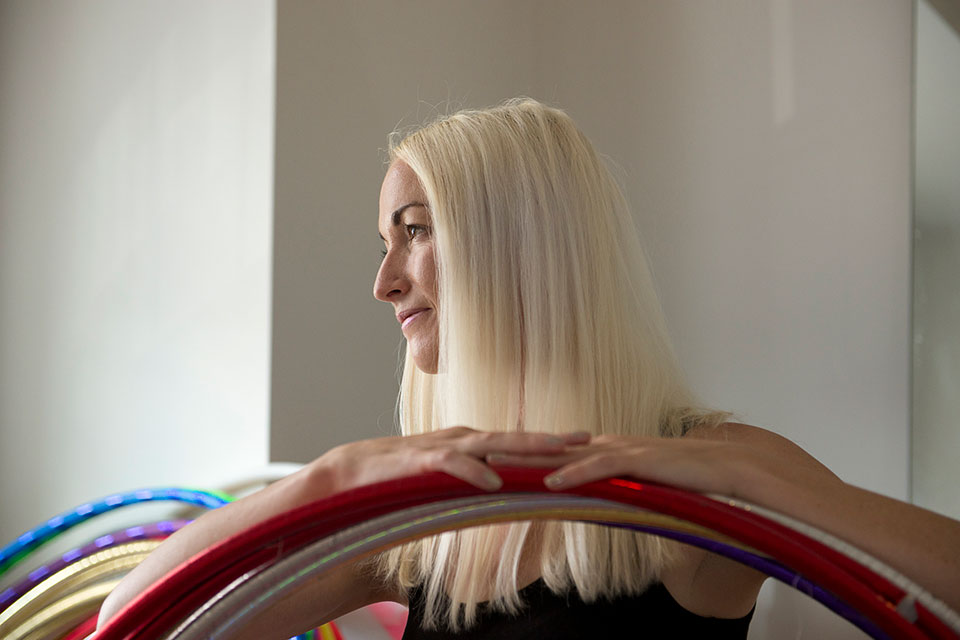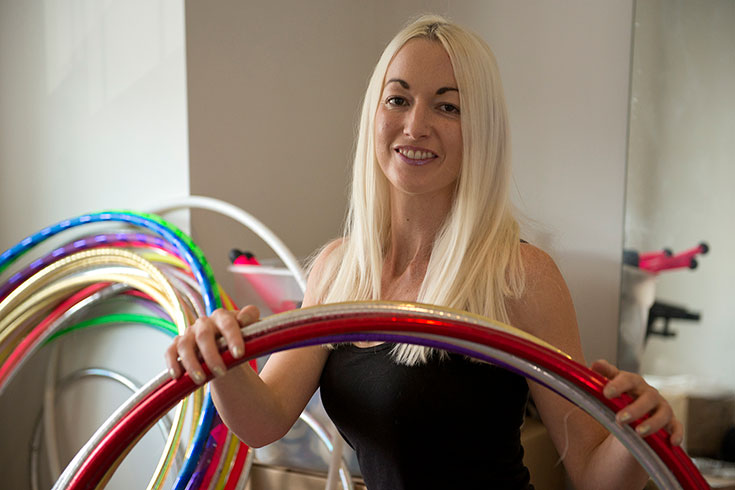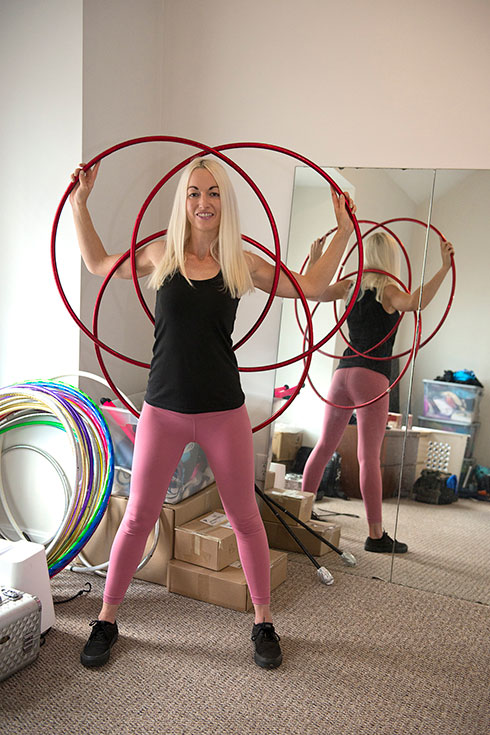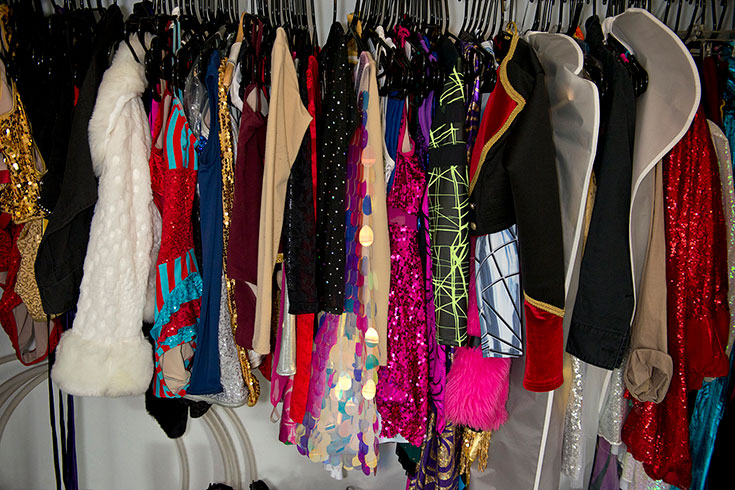Liz: An unexpected path

Liz is a 36-year-old white woman who lives with her partner in a city outside of Boston. Since her teenage years, Liz has suffered from a chronic illness. She now works as a circus performer and owner of a booking agency for performers.
Photo Credit: Sarah Putnam (all photos)
When Liz was nine, her parents divorced, ushering in a time of great emotional upheaval: “I was in that pre-adolescent, angsty phase when the divorce happened. I had a hard time dealing with it.” After the divorce, Liz and her brother continued to live with their mother, a former homemaker who began working at a non-profit organization. Her father, a doctor, soon remarried and Liz and her brother had scheduled visits with him at his home where he lived with his wife and stepchildren.
Liz and her brother attended public schools in the well-off suburban neighborhood in which they grew up. Liz excelled as a student and graduated as valedictorian of her high school class. She entered the Ivy League university that both her parents had attended, intending to major in languages, especially French and Spanish. As a teenager, she imagined that her future would include an intellectually stimulating career, maybe as a professor at a college or university.
 During her college years, the chronic immune illness from which Liz had been suffering since her late teens flared up dramatically. She suffered from severe bouts of dizziness, muscle aches and debilitating physical and mental fatigue. In spite of many visits to doctors and consultations with multiple healthcare providers, no one was able to offer a diagnosis or a cure. She felt frustrated by the insistence of doctors that she was physically fine, but suffering from depression. Eventually she ended up in a medical facility where she was finally diagnosed with an immune illness.
During her college years, the chronic immune illness from which Liz had been suffering since her late teens flared up dramatically. She suffered from severe bouts of dizziness, muscle aches and debilitating physical and mental fatigue. In spite of many visits to doctors and consultations with multiple healthcare providers, no one was able to offer a diagnosis or a cure. She felt frustrated by the insistence of doctors that she was physically fine, but suffering from depression. Eventually she ended up in a medical facility where she was finally diagnosed with an immune illness.
Physically unable to attend school, Liz left college in her third year and moved back in with her mother. “Having my mother just be there for me emotionally was a huge support. She listened to me and helped me get the right foods and medicine, and access to medical care. I needed financial help since I could not work. She and my dad helped me pay the medical and treatment bills. I was finding that holistic medicine and experimental treatments were what really made a difference for me and a lot of that is not even covered by insurance.”
After moving back home, Liz started to look for things she could do while going through treatment. In college, she had enjoyed being a part of the juggling and fire-spinning club: “It was a hobby for me. When I was at my mom’s I started practicing on my own as a way of being physically active that didn’t require too much of me. I was getting more and more into it and I decided to reach out to see if there were other people in the area with the same interests. It was a pivotal moment for me when I realized there was a whole community out there and people who had careers in circus arts. I went to Burning Man, which is an annual event in the desert in Nevada for artists and performers and I was inspired by that. But I never really had a plan to get into performance as a profession or way to making a living. It kind of happened organically and slowly over time.”
 Over the years, Liz has learned to cope with the demands of her illness, which include the need to constantly monitor symptoms and adjust treatments. She has learned to live with the uncertainties of how her illness will develop in the future. Despite these pressures, Liz has become an established circus artist. She offers performances that combine art forms like acrobatics and hooping with music and light shows. She has her own business – a booking agency for circus performers. Liz also has a part-time administrative job at a non-profit organization. Liz’s true passion, though, is performing for live audiences.
Over the years, Liz has learned to cope with the demands of her illness, which include the need to constantly monitor symptoms and adjust treatments. She has learned to live with the uncertainties of how her illness will develop in the future. Despite these pressures, Liz has become an established circus artist. She offers performances that combine art forms like acrobatics and hooping with music and light shows. She has her own business – a booking agency for circus performers. Liz also has a part-time administrative job at a non-profit organization. Liz’s true passion, though, is performing for live audiences.
When the COVID-19 pandemic hit in 2020, Liz felt like she was “falling off a cliff.” With shows and bookings canceled, she lost a big chunk of her income. She was furloughed from her administrative job while her partner, a managerial employee in a client services company, was able to work at home for much of the time. Liz collected unemployment payments for several months. To support her booking company, she also received a small business loan from the federal Paycheck Protection Program (PPP), established in 2020 through the Coronavirus Aid, Relief, and Economic Security Act (CARES Act). These resources, in addition to her savings, cushioned her from economic hardships at this time. Liz has always been able to turn to family and friends with knowledge and expertise in finances for advice about how to manage her money. With their guidance she has opened investment accounts and is planning for her financial future.
Prior to the pandemic, Liz and her partner had been planning to buy a house in a different town. While the rent was affordable where they were living, they had a difficult neighbor above them. They also felt unsafe in the neighborhood, having experienced several incidents of petty crime and vandalism. Liz planned to put her savings into a down payment while her partner applied for a bank loan because he would more easily qualify than her, given his full-time job. But as the price of houses rose, they became increasingly frustrated with what was available to them at an affordable cost. Finally, they decided to relocate to a rental apartment in a different town. The rent is higher, but there is more space and the neighborhood is safer.
 By the spring of 2021, as Covid-19 vaccinations became available and pandemic restrictions eased, Liz saw a sharp uptick in requests for her to perform in person. The booking agency business also began to pick up. Liz is thrilled with the work and the chance to perform in person, which she loves doing. But she remains anxious about the future, given the news of new Covid-19 spikes.
By the spring of 2021, as Covid-19 vaccinations became available and pandemic restrictions eased, Liz saw a sharp uptick in requests for her to perform in person. The booking agency business also began to pick up. Liz is thrilled with the work and the chance to perform in person, which she loves doing. But she remains anxious about the future, given the news of new Covid-19 spikes.
In reflecting on her life as a performer, Liz sees it as an “unexpected path” that emerged out of her illness. She is grateful that she has found a career that she enjoys and is compatible with her lifestyle. “I had to change directions because of my illness. It’s been an unexpected path, but you know, I love what I do. I love the flexibility of the work. And it's introduced me to so many cool people. It’s given me an identity, a community where I belong.”